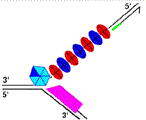Department of Chemistry

Mark A. Griep Publications
Document Type
Article
Date of this Version
2009
Abstract
During DNA replication the helicase (DnaB) recruits the primase (DnaG) in the replisome to initiate the polymerization of new DNA strands. DnaB is attached to the τ subunit of the clamp-loader that loads the β clamp and interconnects the core polymerases on the leading and lagging strands. The τ–DnaB−DnaG ternary complex is at the heart of the replisome and its function is likely to be modulated by a complex network of allosteric interactions. Using a stable ternary complex comprising the primase and helicase from Geobacillus stearothermophilus and the τ subunit of the clamp-loader from Bacillus subtilis we show that changes in the DnaB–τ interaction can stimulate allosterically primer synthesis by DnaG in vitro. The A550V τ mutant stimulates the primase activity more efficiently than the native protein. Truncation of the last 18 C-terminal residues of τ elicits a DnaG-stimulatory effect in vitro that appears to be suppressed in the native τ protein. Thus changes in the τ–DnaB interaction allosterically affect primer synthesis. Although these C-terminal residues of τ are not involved directly in the interaction with DnaB, they may act as a functional gateway for regulation of primer synthesis by τ-interacting components of the replisome through the τ–DnaB−DnaG pathway.


Comments
Published in Molecular Microbiology 72:2 (2009), pp. 537-549; doi: 10.1111/j.1365-2958.2009.06668.x Copyright © 2009 Blackwell Publishing. Used by permission.